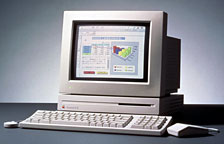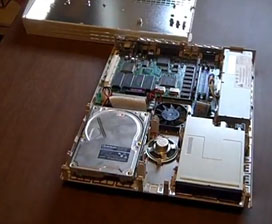The Macintosh Performa line was a
flop. I don't think anybody will argue with that statement, but I do
think some of the Performas are still good computers.
Whether or not the Performa
410 (a.k.a. LC II) my aunt and uncle gave me is one of those good
computers is questionable, but after a few upgrades (and one very long
troubleshooting session), I can honestly say it's taught me a few
things about working with vintage computers.
Like, for instance, don't turn on the mains until everything is
plugged in properly.
Changing Hands
My aunt and uncle have been Mac users for a long time - and still
are. I'm unsure as to whether the Performa was their first computer or
just one of their first computers, but regardless, they'd had it since
it was new in 1993. Now it was just taking up space in their basement,
so they offered it to me, knowing I have a thing for old computers -
especially old Macs.
I like to do a little research before I acquire a computer, so I did
a little looking around at Low End Mac, Wikipedia, YouTube, and
MacTracker, and pretty soon I was thoroughly versed on the Performa
410's look, sound, and characteristics. After my brother Cainon's high
school graduation, when we were returning a table to my aunt and uncle,
I told them I'd take the Performa.
Along with the Performa, they gave me a set of floppies, an old
modem, a LaCie Tsunami external SCSI hard drive (which would shortly be
taking on a larger role than I originally imagined), and an ancient
surge protector. The whole setup (minus the 12" Performa Plus display)
fit in a moderately-sized plastic tote, and my brother Cavin and I had
both the display and the rest out of their house in a single trip.
I wasn't prepared, though, for what happened next.
First Boot
 After we got back home, I unloaded the beige "pizza box" and
its accompanying paraphernalia onto the dining room table, hooked up
the whole thing, and proceeded to flip the power switch on the back to
turn it on.
After we got back home, I unloaded the beige "pizza box" and
its accompanying paraphernalia onto the dining room table, hooked up
the whole thing, and proceeded to flip the power switch on the back to
turn it on.
Instead of the traditional "bong", the Performa emitted a very
small, very pretty tritone (Jim Reekes, creator of the Mac startup
chime, called it the "horrid tritone"; this tritone was what motivated
him to create the "bong"). I was prepared for this little chime, but
nobody else was. My brothers and sisters who were around at the time
remarked on how weird the sound was, and I had to explain to them that
this was the sound they used before the "real" startup sound.
Then it was my turn to be surprised. After years of using monochrome
680x0 Macs, I didn't quite believe my eyes when I started seeing System
7.5 booting in color. Somehow I'd neglected to notice this strange and
wondrous phenomenon when I watched YouTube videos of the LC II - and I
was elated. It was like System 7 had been totally reborn for me - it
was no longer that monochrome lightweight from my PowerBooks, but a
"real" operating system: vibrant, vivid, and clearly superior to its
Windows counterparts from that era.
Soon, Cavin was playing games on it, and it was then I started to
realize what I'd picked up - this wasn't a professor's computer, like
my PowerBook 180. This Performa
was meant for more than just word processing - it had been a family
computer, used for everything from finances to education to games. This
is what the 680x0 Macs had really been about, and they really weren't
as far-off from the Intel Macs as I had previously thought.
But Then...
Sure enough, something was bound to go wrong. The day after I picked
it up, it refused to boot from the hard drive, and that's where the fun
began.

Inside Austin's Performa 410.
At first, I thought it might just be a dead hard drive, so I opened
up the LaCie Tsunami and put its drive in the Performa's case. No joy -
now it wouldn't even chime. I did a little research and found out the
Quantum ProDrive LPS 240S that was in the Tsunami needed terminating
resistors (I'm new to the world of SCSI, so I was completely in the
dark there). I pulled two resistors off the Quantum ProDrive ELS 85S
that had been in the Performa and put them on the LPS. Now the Performa
would start up, but it still wouldn't recognize the drive.
Various utilities and such couldn't get the Performa to recognize
the LPS, so I started thinking the SCSI bus had gone bad. One of the
LEM Vintage Macs group members
(thanks Dale!) went above and beyond the call of duty and sent me an
LC III (a.k.a. Performa 450)
motherboard, a 16 MB RAM stick, a PDS Apple ethernet card, and several
disk utilities on a few floppies. But even that couldn't persuade the
Performa to recognize the LPS.
I got out my thinking cap and analyzed the situation a bit longer.
After a while, I came to the conclusion that I'd been right all along -
the ELS was dead - but I'd tried to solve the problem in the wrong way.
The LPS needed different terminating resistors than the ELS, so said
its service manual (I just have a way of finding these - I now have
service manuals for every Mac in my house, as well as for my Nissan
Sentra), so I figured the Tsunami must have terminated it. Sure enough,
the Tsunami had the resistors in it - soldered down. Resigning myself
to using the external drive for now, I removed the LPS from the
Performa, put the Tsunami back together, and fired it up.
It worked. The Performa was able to read from and write to the
Tsunami just fine - no SCSI bus problem after all. With that problem
finally solved after a week of overdriven logical and conceptual
thinking, I turned my headache-ridden brain towards a much simpler
problem.
Mac OS 7.6.1: The Final Frontier
That 25 MHz LC III logic board and 16 MB RAM stick did more than
just give the Performa a little giddy-up - it opened the door to new
system possibilities, and the one that looked the most appetizing was
the final update to System 7, Mac OS 7.6.1.
Hurriedly fetching a set of 7.6 disk images from www.[can't tell
you].com, I proceeded to write them to a set of floppies with HFVExplorer, a program
that lets PCs read and write Mac floppies, on my old Windows 2000 PC.
Surprisingly, this actually went according to plan - no disk errors or
whatnot - and within the hour, System 7.6 was running on the Performa.
Shortly afterwards, I had the 7.6.1 update installed, and that's when
the real fun got started.
High Speed Internet - Sort Of
The ethernet card presented possibilities as well, not the least of
which was the possibility of actually using the Performa for accessing
the Internet. Lugging the whole system downstairs, where my router is,
I set it back up, endured a little stubbornness from the PRAM, and then
plugged it into the LAN.
The network took a tiny bit of configuration (not nearly as much as
my stupid PCs had), but soon my iMac G4 (in Mac OS 9 rather than
OS X) and the Performa were AppleTalking to each other, and I'd
passed iCab pre-2.9.9 (the last
version for 680x0 Macs) from the former to the latter.
[schoolgirl squeal of delight]
Next, I tried iCab. Needless to say, a 25 MHz CPU, 20 MB of RAM (4
MB onboard plus 16 on a stick), and 256 KB of VRAM don't make for a
zippy Internet experience. About the only page that loaded somewhat
quickly was (no surprise here) Low End Mac. Mac GUI City (hint, hint) also worked
well.
Download speeds clocked at about 80 KB/s, which is probably blazing
for that old Performa.
The Next Steps
As it turned out, the Performa Plus display's button died, so I'm
currently using a Lego brick and some masking tape to keep it turned on
while I search for a display adapter and a flatscreen so I can replace
it. Currently, I'm working on getting my PC to share its wireless
Internet with the Performa via ethernet (it's back up in my room), at
which point I'll probably start using it for awesomely retro emails
("Sent from my Macintosh Performa 410").
Until next time, viva la Performa!

Austin Leeds is a Mac and iPad user - and a college student in Iowa.

 After we got back home, I unloaded the beige "pizza box" and
its accompanying paraphernalia onto the dining room table, hooked up
the whole thing, and proceeded to flip the power switch on the back to
turn it on.
After we got back home, I unloaded the beige "pizza box" and
its accompanying paraphernalia onto the dining room table, hooked up
the whole thing, and proceeded to flip the power switch on the back to
turn it on.

